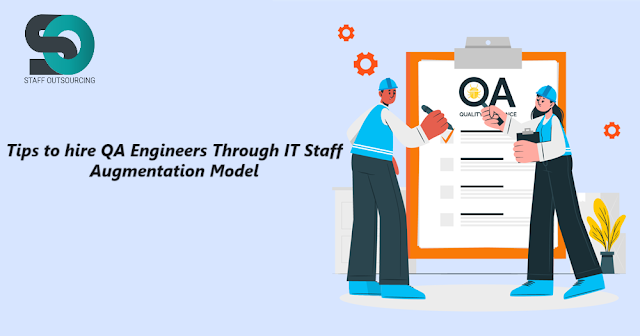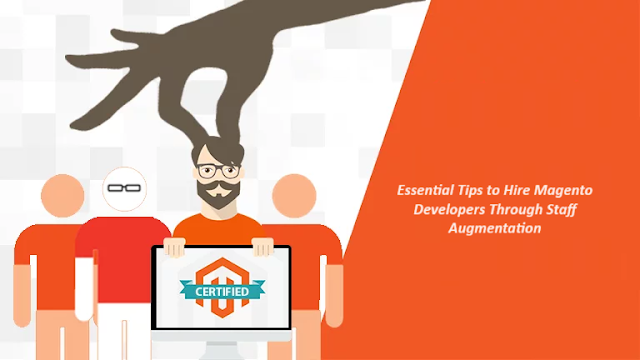Tips to hire QA Engineers Through IT Staff Augmentation Model
In the dynamic landscape of software development, ensuring the quality of your products is paramount. The role of Quality Assurance (QA) engineers is crucial in this pursuit, as they play a pivotal role in maintaining and enhancing the overall quality of software. In recent years, many companies have turned to the IT staff augmentation model to bolster their QA teams efficiently. This model allows organizations to augment their in-house teams with external QA experts on a temporary basis, providing flexibility and cost-effectiveness. In this blog post, we will delve into key tips to hire QA engineers through the IT staff augmentation model.
Define Clear Objectives and Requirements:
Before embarking on the hiring process, it's imperative to define clear objectives and requirements for the QA role you are looking to fill. Outline the specific skills, expertise, and experience needed for successful candidates. This clarity ensures that both your internal team and the external QA engineers are aligned on expectations, leading to a more productive collaboration.
Partner with a Reputable Staff Augmentation Provider:
Choosing the right staff augmentation provider is a critical step in ensuring the success of your QA hiring strategy. Look for providers with a proven track record, positive client testimonials, and a pool of skilled QA engineers. A reputable provider should be able to understand your unique requirements and match you with professionals who possess the necessary skills and domain expertise.
Thoroughly Assess Technical Skills:
Technical proficiency is at the core of a QA engineer's role. When evaluating potential candidates, conduct rigorous technical assessments to gauge their expertise in testing methodologies, automation tools, and other relevant technologies. This step helps in selecting QA engineers who can seamlessly integrate into your existing workflows and contribute effectively to your projects.
Prioritize Communication and Collaboration Skills:
While technical skills are essential, effective communication and collaboration are equally crucial for a QA engineer working in a staff augmentation model. Assess candidates' ability to communicate clearly, work collaboratively with in-house teams, and adapt to different project environments. Strong interpersonal skills ensure a smooth integration of external resources into your existing development processes.
Consider Domain Knowledge:
Depending on your industry and the nature of your projects, domain knowledge can significantly impact the effectiveness of QA engineers. Consider candidates who have experience or familiarity with your industry, as they will be better equipped to understand the unique challenges and requirements of your software applications.
Flexible Contracts and Scalability:
One of the key advantages of the staff augmentation model is its flexibility. Opt for contracts that allow scalability, enabling you to adjust the size of your QA team based on project requirements. This flexibility ensures that you can efficiently manage workloads during peak development phases and scale down during quieter periods, optimizing resource utilization and costs.
Establish Clear Communication Channels:
Transparent and open communication is essential for successful collaboration between in-house and augmented teams. Set up clear communication channels, including regular meetings, status updates, and project documentation. Utilize collaboration tools and project management platforms to foster seamless communication, ensuring that everyone is on the same page regarding project goals and progress.
Provide Onboarding and Training:
Despite their expertise, external QA engineers may need some time to familiarize themselves with your company's processes, tools, and specific project requirements. Facilitate a smooth onboarding process and provide necessary training to bridge any gaps. This investment in onboarding pays off in the form of increased efficiency and a quicker integration of external resources.
Encourage Knowledge Sharing:
Foster a culture of knowledge sharing between your in-house and augmented QA teams. Encourage regular team meetings, collaborative problem-solving sessions, and the exchange of best practices. This not only enhances the skills of your entire QA team but also promotes a sense of unity and camaraderie among team members, regardless of their location or employment model.
Monitor and Evaluate Performance:
Continuous monitoring and evaluation are crucial to ensure that your QA engineers are delivering the expected value. Establish key performance indicators (KPIs) and regularly assess the performance of the augmented team. Solicit feedback from both in-house and external team members to identify areas for improvement and implement adjustments as needed.
Conclusion:
Hiring QA engineers through the IT staff augmentation model can be a strategic move to enhance your software development capabilities. By following these tips, you can streamline the hiring process, foster effective collaboration, and ultimately achieve higher levels of quality in your software products. Embrace the flexibility and expertise that IT Staff Augmentation Services offer and empower your QA teams to meet the ever-evolving challenges of the software development landscape.



Comments
Post a Comment